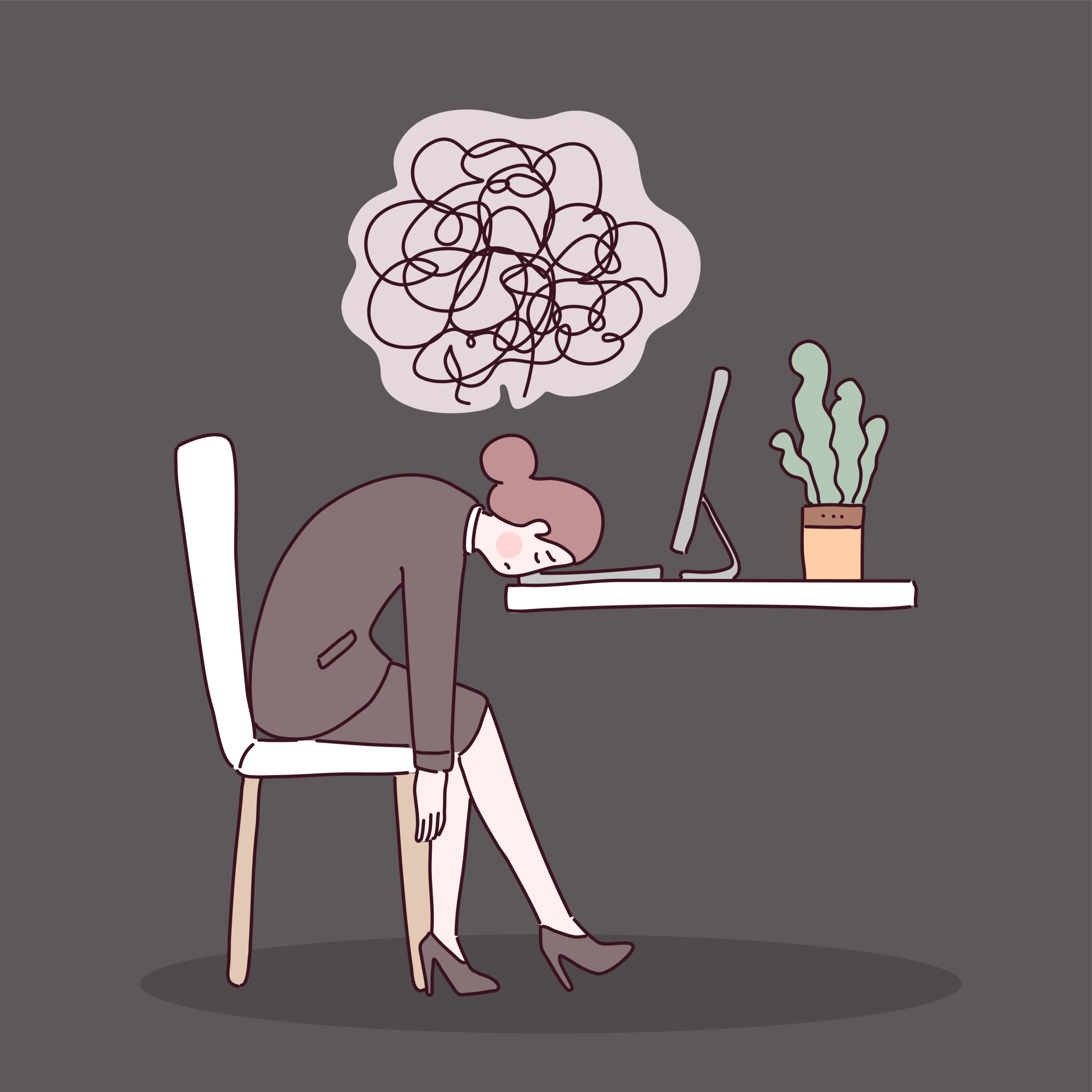
Its Friday afternoon and you have a long to-do list to get through. You’re keen to get away on time today but then a colleague rushes over. She’s behind on stuffing envelopes for the final post and desperately needs your help. Inside you’re screaming “noooo” but find yourself nodding “yes no problem” politely. By the time 5pm comes along she bounces out of the door, full of gratitude but you skulk towards your desk full of resentment. You’re behind on your deadlines now and have to work extra hard to catch up. Sound familiar? If you don’t know how to say no at work its likely you are people pleasing which is causing of work stress. This blog will share more information about people pleasing and tips on how to say no at work.
Signs people pleasing is increasing your work stress.
At the end of the day, we all want to impress the boss and get on well with our colleagues if we care about our career. However, caring excessively what everyone at work thinks can increase stress and anxiety and potentially harm your career. Not being able to say no is one obvious sign of people pleasing at work but here are some others
- You push yourself hard to meet impossible deadlines rather than be realistic and honest about your workload.
- You lie awake at night worrying about mistakes that probably won’t happen.
- You feel very anxious if your boss emails to say they want to speak to you even though it’s never about anything serious.
- You respond to every email straight away regardless of what else you have on because you are worried about letting people down.
- You take work home to catch up rather than be behind.
- You daren’t ask for help or let anybody know that you are struggling.
- You agree to extra work in meetings even if you don’t have time.
- You’re often the person people go to for help because you always say yes.
What causes people pleasing in the workplace
There are actually different styles of people pleasing which means different causes. It can therefore be helpful to understand your own style and whats motivating you to please. You can read more about that here. For example, do you find it hard to say no because of feeling responsible for other peoples emotions or do you fear rejection? Do you get anxious about making mistakes because of fear of getting into trouble or because your self worth is tied up with doing things perfectly?
As you can see, often the behavior is the same but the underlying reasons are different. Understanding the motivation can help you challenge whether your assumptions are true and fair. For example, would people really reject you if you say no? If they did would that be fair? You can read more about challenging unhelpful assumptions below.
However, even though people pleasers are motivated by different reasons, low self esteem is usually a big underlying cause.
People who struggle with low self esteem will be more in need of approval from others to feel good about themselves or feel their worth is tied up in their achievements. This makes them on high alert for signs of disapproval or rejection as well a finding any indication that someone might not be happy with them very distressing.
How to stop say no at work and stop people pleasing
 The good news is that if your work stress is caused by people pleasing, as opposed to a toxic environment for example, then there is alot within your control to address that. Its not easy though and can take time and practice but here are 7 evidence based strategies to reduce people pleasing and show you how to say no at work.
The good news is that if your work stress is caused by people pleasing, as opposed to a toxic environment for example, then there is alot within your control to address that. Its not easy though and can take time and practice but here are 7 evidence based strategies to reduce people pleasing and show you how to say no at work.
Put in bounderies: Gradually
Its worth thinking about what you genuinely want to do and not do and then gradually move towards that behaviour. If you are unsure, ask yourself what you would do if you didn’t care what people thought. Perhaps you can decide to help others when your workload is managable but not when you are working towards a deadline? Or if you are regularly taking work home or working late slowly reduce that so you’re work life balance is better. It helps to do it very gradually, with small steps, as changing too quickly can be too stressful. Once you’ve learnt that you can say no without people being angry, you’re are exposing yourself to realistic scenarious .
Be more assertive by preparing ways of saying no
Often people pleasers find themselves saying yes more than they want to because saying no feels scary and unfamiliar. Its common for people to describe getting anxious, their minds going blank and defaulting to their usual response. Write down what you would like to say and practice. Keep it short and factual i.e. “I would love to help but I have a deadline to meet” or “I have been asked to do this extra task but do not have capacity with the work I currently have on”
Challenge your assumptions
So much of people pleasing behaviour is driven by unhelpful thoughts, particularly around other people’s reactions. For example, you may be assuming that someone will be angry if you say no or that your boss will think you are bad at your job for making a mistake. These are known as “Negative Automatic Thoughts” and we normally have little evidence that they are real. Ask yourself what thoughts are causing the anxiety, whether you have evidence (i.e. Is it a thought or a fact?) and try to generate more realistic alternatives. Learning Cognitive Behavioral Therapy techniques yourself or from a CBT trained therapist can help.
Learn mindfulness
 Many stressed worked who struggle with people pleasing will find themselves overthinking work scenerious which increases anxiety. For example, you might dwell over what a colleague thinks or lie awake at night worrying about a work project.
Many stressed worked who struggle with people pleasing will find themselves overthinking work scenerious which increases anxiety. For example, you might dwell over what a colleague thinks or lie awake at night worrying about a work project.
Mindfulness really helps reduce the overthinking that people pleasers experience. It involves observing unhelpful thoughts, not trying to push them away and can eventually stop thoughts from spiralling.
Mindfulness is also fantastic at helping you tune into and respond differently to uncomfortable feelings such as dread in chest or tightness in muscles.
Practice Self Compassion
People pleasers find it hard to be kind to themselves which also means they judge themselves for being a people pleaser in the first place! Self compassion helps you to recognise that something is hard and be being kind to yourself whilst you are making changes. Therefore learning how to use self compassion can be really effective when you are learning how to say no at work. An easy way of developing self compassion is asking what you would say to a friend. There is lots of evidence that self compassion can help with a wide variety of mental health difficulties and there’s a wide range of meditations and tools to help as well as specially trained therapists .
Reduce anxiety with breath and body based exercises
Is saying no feels unsafe then it is likely are you experiencing alot of physical symptoms of anxiety in the body which keeps people pleasing going. For example if someone asks you to do something and you want to say no, its likely that your breath will quicken, the heart will beat faster and muscles will tense. If so, a person will normally automatically do whatever it takes to get rid of those feelings quickly, which often means saying yes. Therefore, when you are learning how to say no at work, it can be helpful to learn tools to manage anxiety. For example, practice deep breathing and make a conscious effort to relax your muscles. This will help to regulate your anxiety so that saying no does not feel as stressful.
Increase self esteem
Since low self esteem is the main underlying cause of people pleasing at work then ultimately the best protection against this is to improve self esteem. When you feel good about yourself other peoples opinions matter less and we will therefore make decisions based on our own needs rather than fear. However, this is obviously easier said that done as low self esteem is usually deeply ingrained from childhood. But recognising this is the cause so you can work on how you feel about yourself is the first step. It can take a long time to increase self esteem but it is possible with hard work, the right resources and potentially. You can read more about how to increase self esteem here.
Want to work with me?
I’m a fully qualified therapist and mindfulness coach specialising in anxiety and low self esteem. I offer practical, evidence based tools that worked for me.
If you’re interested in working with me to feel calmer and more confident in your social life click below for a FREE 30 min consultation.

